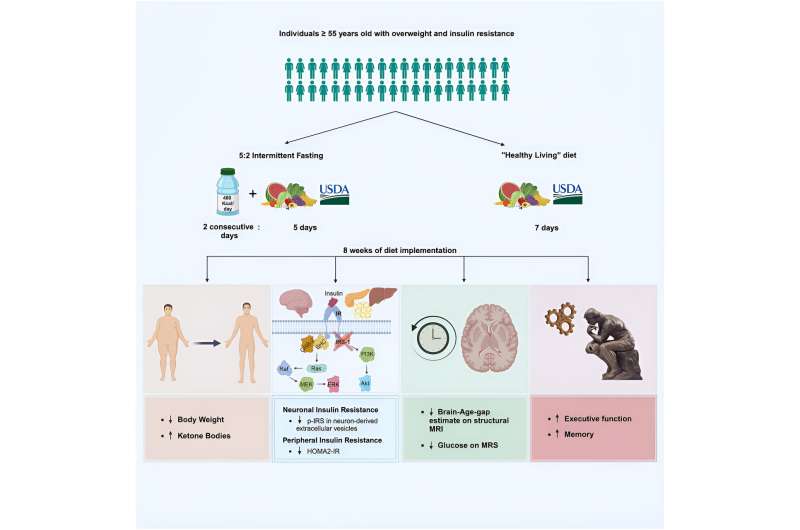This article has been reviewed according to Science X's editorial process and policies. Editors have highlighted the following attributes while ensuring the content's credibility:
fact-checked
peer-reviewed publication
trusted source
proofread
Pilot study provides 'blueprint' for evaluating diet's effect on brain health

Researchers from Johns Hopkins Medicine and the National Institutes of Health's National Institute on Aging say their study of 40 older adults with obesity and insulin resistance who were randomly assigned to either an intermittent fasting diet or a standard healthy diet approved by the U.S. Department of Agriculture (USDA) offers important clues about the potential benefits of both eating plans on brain health.
The paper is published in the journal Cell Metabolism.
Insulin resistance is a hallmark of type 2 diabetes and is common in people with obesity. Studies suggest that people with insulin resistance are at higher risk than usual for Alzheimer's disease and other cognitive impairment. As a result, various weight loss regimens figure widely as ways to reduce risk of these metabolic and brain disorders.
Previous Johns Hopkins research on animal models of diabetes and Alzheimer's disease has shown that intermittent fasting can improve cognition and insulin sensitivity. The new study tested the effects of intermittent fasting on women and men at risk for cognitive impairment. It offers a "blueprint," the authors write, for using a wide panel of biomarkers to assess dietary impact, including analysis of extracellular vesicles—tiny packets of materials shed from neurons, which are types of brain cells that send messages. Such neuron-derived extracellular vesicles are shed into circulating blood and were collected from the new study's participants during an eight-week period while each person followed one of the two diets.
The results revealed that both types of diet plans had benefits regarding decreasing insulin resistance and improving cognition, with improvements in memory and executive function with both diets, but more strongly with the intermittent fasting diet, according to Mark Mattson, Ph.D., adjunct professor of neuroscience at the Johns Hopkins University School of Medicine and former chief of the laboratory of neurosciences at the National Institute on Aging in Baltimore.
"Other scientists may want to incorporate the (brain) markers (we used) into additional, larger studies of diet and brain health," Mattson says.
Because people with obesity and insulin resistance may be more at risk of cognitive impairment and Alzheimer's disease than people with normal metabolism and body mass index (BMI), Dimitrios Kapogiannis, M.D., chief of the human neuroscience section at the National Institute on Aging and adjunct associate professor of neurology at the Johns Hopkins University School of Medicine, developed a method to isolate neuron-derived extracellular vesicles from blood. His laboratory found molecular evidence of insulin resistance in extracellular vesicles shed from neurons of people with diabetes and Alzheimer's disease, and because blood samples are relatively easy to collect, they were considered good candidates for widespread use.
To test the effects of the two diets on brain function biomarkers, participants in the new study were recruited from June 2015 and December 2022, and four in-person assessments were completed at facilities run by the National Institute on Aging at MedStar Harbor Hospital in Baltimore.
Among the participants, 40 completed their eight-week study. Also, 20 were assigned to an intermittent fasting diet that restricted calories to one-quarter of the recommended daily intake for two consecutive days per week, and they followed the USDA's healthy living diet—which consists of fruits, vegetables, whole grains, lean proteins, low-fat dairy products and limited added sugars, saturated fats and sodium—for the remaining five days. The USDA's healthy living diet was assigned to 20 other study participants each day of the week.
The average age of participants in both groups was 63, and 25 were white, 14 were Black and one was Hispanic. There were 24 men and 16 women. All were obese and had insulin resistance.
The researchers found that both diets had equally positive effects on reducing insulin resistance markers in extracellular vesicles, improving BrainAGE (a measurement of the brain's biological age using structural MRI data) and lowering glucose concentration in the brain. Reduced glucose concentration is a corollary of higher glucose use.
Both diets also improved customary measurements of metabolic health, including weight, BMI, measurement of waist circumference, blood lipids such as cholesterol, and insulin resistance.
Executive function and memory (which are a set of mental skills that help with planning and achieving goals) improved approximately 20% more in the intermittent fasting group than in the healthy living diet group.
A few study participants reported modest side effects including constipation and loose stools, and occasional headaches.
The researchers also saw increased levels of a neurofilament protein (a structural protein in neurons) in both diet groups, but mainly in the intermittent fasting group. What that means regarding brain health is unclear.
"This is a marker to continue to evaluate in further studies," says Mattson. "Neurons release a lot of proteins, and one idea is that intermittent fasting may be causing some kind of neuroplasticity (a change in structure) in neurons, causing the release of neurofilament proteins."
The Johns Hopkins researchers and others caution that people interested in intermittent fasting should plan carefully with a health care practitioner because it could be harmful to some people, including those with type 1 diabetes and eating disorders.
More information: Dimitrios Kapogiannis et al, Brain responses to intermittent fasting and the healthy living diet in older adults, Cell Metabolism (2024). DOI: 10.1016/j.cmet.2024.05.017

















